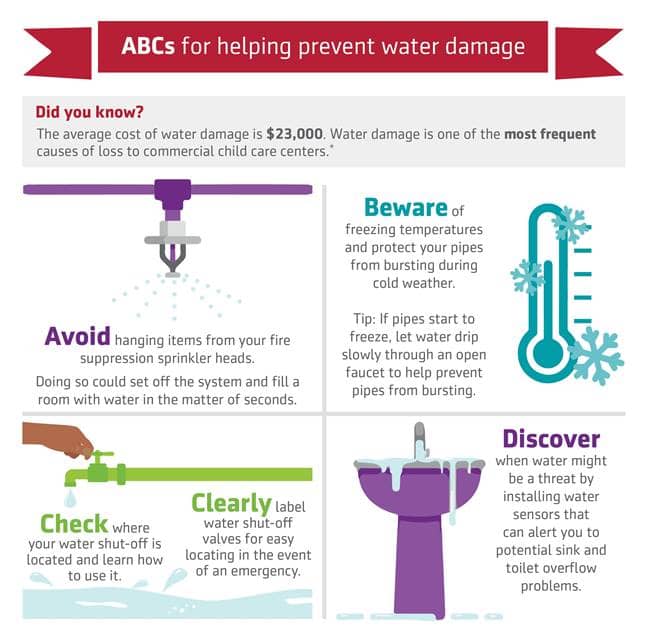Emergency action planning for child care centers

When emergencies or disasters occur, having an emergency action plan for your child care center can put you in a better position to keep children, staff, and other occupants safe. Preparation is an essential element of emergency management. Taking the time to develop a written action plan, train staff members, and conduct practice drills can reduce the potential for injuries, lost children, and other incidents during a crisis.
Some people may think that an emergency action plan is simply a written document to follow when an incident occurs. However, there is little to no time to read lengthy documents in a crisis, and knowing how to execute the procedures ahead of time can be the difference between life and death. An effective emergency action plan should include the following:
- A written plan
- Staff training
- Regular practice drills
- Communication with parents and guardians
Written plan development
A formal emergency action plan should be developed as a written document that is easily accessible for child care management and staff members at any given time. The plan serves as a reference for procedures and should drive initial and ongoing training activities. Child care directors or another person in charge of safety administration should review and update the plan at least bi-annually or anytime there is a change affecting the processes and procedures.
Summary of required emergency action plan components outlined by NFPA 101, Life Safety Code:
- Procedures for reporting emergencies
- Emergency response by staff and occupants
- Evacuation, relocation, and shelter-in-place procedures
- Appropriate elevator use
- Fire drill design and conduct
- Building fire protection system type and coverage
- Other items required by the authority having jurisdiction
Staff training
All staff members may receive training on the contents of and executing processes of the written plan at the following intervals:
- When the plan is first implemented
- When an employee is initially hired or assigned to a job
- When an employee’s responsibilities under the plan change
- When the plan is revised due to changes in facility conditions, equipment, or emergency procedures
- At regular intervals as a refresher course (e.g., monthly, quarterly, semi-annually, or annually)
Management and administration should keep records documenting staff training. Data that can be captured include employee names, dates of training, and topics covered.
Regular practice drills
Practicing the procedures detailed in the written emergency action plan will help ensure it is effectively and efficiently executed. Proper execution of emergency response processes in a crisis can be the difference between life and death. Conduct emergency evacuation and response drills regularly, and after completion, evaluate how they went and determine if improvements can be made to the written plan or staff training modules.
Communication with parents and guardians
Parents and guardians of children enrolled at a center experiencing an emergency will be understandably concerned about their child’s safety and wellbeing. Communicating with parents and guardians as soon as it is safe is imperative in a crisis, making it an essential element to include in the emergency action plan.
Despite its importance, communication may not always be an easy task when an emergency occurs. A center with written procedures and guidelines for keeping parents and guardians informed will likely be better positioned to communicate efficiently and effectively. Please seek professional counsel regarding information specific to your center and applicable regulations.
Click here to access the “Guide to crisis management” for additional information on emergency action plans for child care centers.
Source
NFPA 101, Life Safety Code, 2021
ABCs for helping prevent water damage

*Data based on reported claims activity for child care insureds experiencing water damage (other than floods) from 1/1/2016-7/31/2021 from all Markel Specialty Commercial insuring companies.
This document is intended for general information purposes only, and should not be construed as advice or opinions on any specific facts or circumstances. The content of this document is made available on an “as is” basis, without warranty of any kind. This document can’t be assumed to contain every acceptable safety and compliance procedures or that additional procedures might not be appropriate under the circumstances. Markel does not guarantee that this information is or can be relied on for compliance with any law or regulation, assurance against preventable losses, or freedom from legal liability. This publication is not intended to be legal, underwriting, or any other type of professional advice. Persons requiring advice should consult an independent adviser. Markel does not guarantee any particular outcome and makes no commitment to update any information herein, or remove any items that are no longer accurate or complete. Furthermore, Markel does not assume any liability to any person or organization for loss of damage caused by or resulting from any reliance placed on that content.
*Markel Specialty is a business division of Markel Service, Incorporated, the underwriting manager for the Markel affiliated insurance companies.
© 2021 Markel Service, Incorporated. All rights reserved.

This "document” is intended for general information purposes and should not be construed as advice or opinions on any specific facts or circumstances. The content of this document is made available on an “as is” basis, without warranty of any kind. This document cannot be assumed to contain every acceptable safety and compliance procedure or that additional procedures might not be appropriate under the circumstances. Markel does not guarantee that this information is or can be relied on for compliance with any law or regulation, assurance against preventable losses, or freedom from legal liability. This publication is not intended to be legal, underwriting, or any other type of professional or technical advice. Persons requiring advice should consult an independent adviser or trained professional. Markel does not guarantee any particular outcome and makes no commitment to update any information herein, or remove any items that are no longer accurate or complete. Furthermore, Markel does not assume any liability to any person or organization for loss or damage caused by or resulting from any reliance placed on this content.
Markel® is a registered trademark of Markel Group Inc.
© 2023 Markel Service, Incorporated. All rights reserved.
